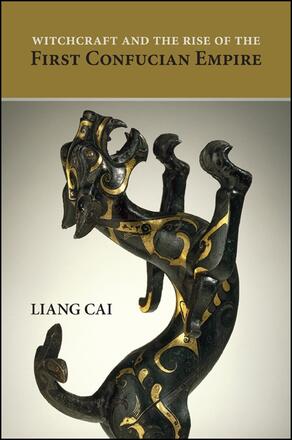
Witchcraft and the Rise of the First Confucian Empire
Alternative formats available from:
Contests long-standing claims that Confucianism came to prominence under China's Emperor Wu.
Description
Finalist for the 2015 Best First Book in the History of Religions presented by the American Academy of Religion
Winner of the 2014 Academic Award for Excellence presented by Chinese Historians in the United States
When did Confucianism become the reigning political ideology of imperial China? A pervasive narrative holds it was during the reign of Emperor Wu of the Han dynasty (141–87 BCE). In this book, Liang Cai maintains that such a date would have been too early and provides a new account of this transformation. A hidden narrative in Sima Qian's The Grand Scribe's Records (Shi ji) shows that Confucians were a powerless minority in the political realm of this period. Cai argues that the notorious witchcraft scandal of 91–87 BCE reshuffled the power structure of the Western Han bureaucracy and provided Confucians an opportune moment to seize power, evolve into a new elite class, and set the tenor of political discourse for centuries to come.
Liang Cai is Assistant Professor of History at the University of Arkansas.
Reviews
"…presents much food for thought … an important contribution to an ongoing scholarly dialogue on one of the central topics in Western Han history. " — Journal of the American Oriental Society
"Liang Cai's book represents the very best of the modern iconoclastic trend to see through early and traditional Chinese accounts concerning early Chinese group formations, in this case with exclusive attention to Confucianism. None of her claims argue from logic or absence; rather, they are grounded in solid quantitative and qualitative analyses and stem from a solid historical methodology. " — China Review International
"…a forcefully argued and methodologically innovative study of Western Han political and intellectual history … Witchcraft and the Rise of the First Confucian Empire is a very welcome contribution to the expanding sophisticated and skeptical historiography concerning the early imperial history in China—the period that laid the foundations for all that came after. " — Chinese Historical Review
"Liang Cai's book is a valuable resource for those who study the intellectual and political history of the Han dynasty, especially the hundred years from Emperor Wu to Emperor Yuan … this book provides a factual, well-written narrative. Scholars interested in early imperial China will find the quantitative and qualitative approach useful in their own research. " — Religious Studies Review
"Writing in a clear and accessible way that paints a vivid and comprehensive picture of the state of the early Han political system with its variety of political machinations, Cai has produced a well-structured and well-argued monograph that includes detailed notes and a wide range of references in English, Chinese, and Japanese. " — The Pomegranate
"Readers interested in the history of the Han Empire will find this book to be an invaluable addition to the current literature on the topic. It is a must-read for all scholars and students of early imperial period China … the overall narrative is strong, convincing, and, dare I say, game changing. " — Erica Fox Brindley, American Historical Review
"Through a detailed analysis of the surviving textual evidence, Witchcraft and the Rise of the First Confucian Empire provides a powerful image of the destruction of one order in the last years of the reign of Emperor Wu and the creation of a new elite under Huo Guang. Though these events have already been the subject of at least one detailed English-language study … the narrower time-frame and more focused narrative in Liang Cai's study provides an even more powerful picture of the enduring aftermath of Emperor Wu's witchcraft trials. " — Journal of the Royal Asiatic Society